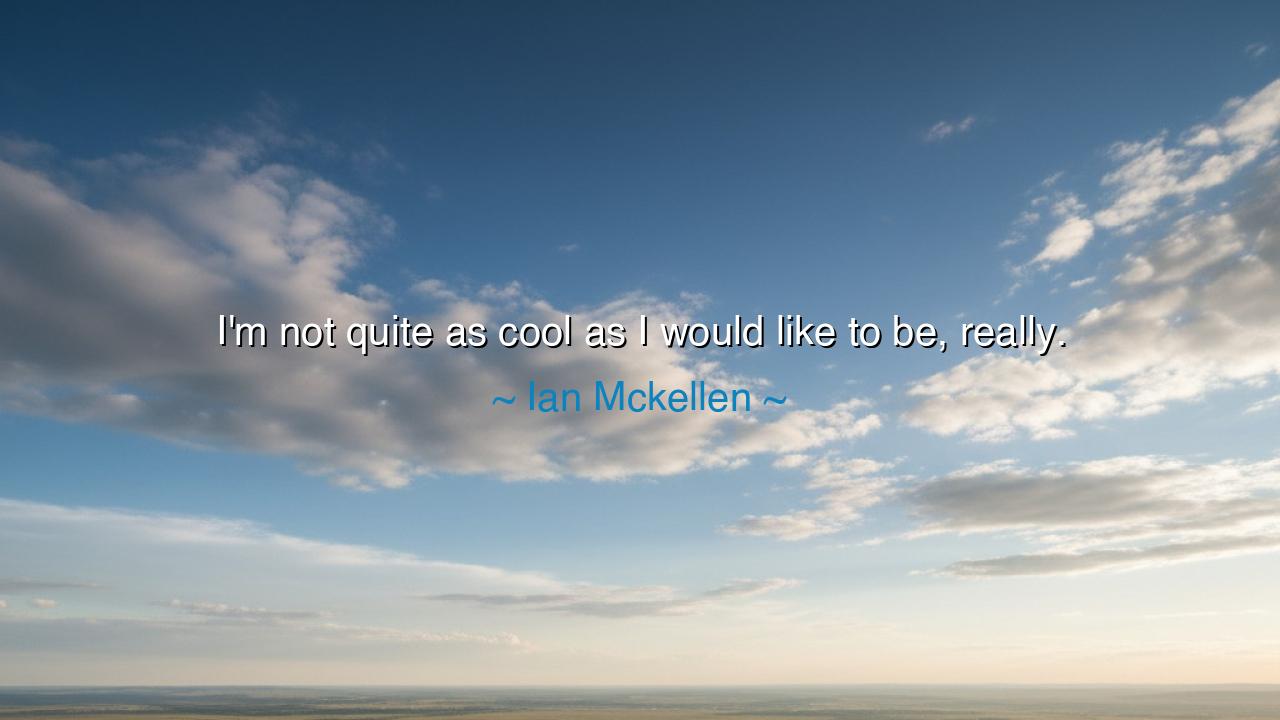
I'm not quite as cool as I would like to be, really.






"I'm not quite as cool as I would like to be, really." These humble words spoken by Ian McKellen are a reflection on the nature of self-perception, humility, and the inevitable gap between idealization and reality. McKellen, a man who has achieved great success in his career and is widely admired for his talent and wisdom, acknowledges that even those who are often seen as "cool" or perfect by others may still struggle with feelings of insecurity or imperfection. His admission speaks to the universal human experience—that no matter how high we rise or how much we accomplish, we are all haunted by the sense that we are not enough, that there is always more to aspire to. McKellen's words challenge the idea of coolness as something external or easily attained, pointing to the deeper, internal reality of what it means to truly be content with oneself.
In the ancient world, philosophers like Socrates and Plato grappled with the concept of self-awareness and virtue. Socrates famously said, "Know thyself," teaching that true wisdom comes not from external achievement, but from an honest understanding of one’s own limitations and imperfections. To know oneself is not to pretend to be perfect, but to accept one's flaws and struggles, and to continuously seek growth and understanding. Just as McKellen acknowledges his own imperfections, Socrates believed that the greatest minds were those who understood their own humanity and embraced it fully, knowing that the journey of self-improvement was an ongoing process, not a final destination.
Consider the story of Alexander the Great, whose military conquests and achievements made him a legend in his own time. Yet, despite his greatness, Alexander was often plagued by self-doubt and internal conflict. He saw himself as both a mortal and a divine figure, constantly battling with the tension between the idealized image of himself and the reality of his vulnerabilities. McKellen’s words mirror this ancient truth: that even those who are perceived as "cool" or great may still struggle with their inner insecurities. Alexander’s accomplishments were monumental, but they did not grant him the peace he sought within. His story teaches us that external success does not always equate to inner fulfillment, and that the human soul is always in search of balance and peace.
Similarly, the story of King Solomon, known for his great wisdom, reflects a similar paradox. Despite his wealth, power, and the respect he commanded, Solomon’s writings in the Book of Ecclesiastes reveal his deep sense of emptiness and discontent. "Vanity of vanities," he writes, "all is vanity." Solomon’s reflections highlight the futility of seeking external markers of coolness or success without understanding the inner journey. In his case, wisdom and material wealth brought him little peace because he did not find satisfaction in his own soul. McKellen’s quote, in this light, can be seen as an acknowledgment that the external image of being "cool" or perfect is not enough; the true value lies in how we accept ourselves despite our imperfections.
The lesson we can draw from McKellen’s statement is not one of self-doubt or resignation, but of humility and self-acceptance. It is an invitation to recognize that perfection—whether it is in coolness, success, or appearance—is not the goal of life. Instead, it is the embracing of our own flaws and imperfections that allows us to move forward with true wisdom and grace. Like McKellen, we must accept that we may not live up to the ideal we have set for ourselves, but that does not diminish our worth or the impact we have on the world around us. True fulfillment comes not from seeking perfection, but from being present with who we are, with all of our humanity, and striving to grow and evolve each day.
In our own lives, let us take McKellen’s humility to heart. Let us accept that we, too, are imperfect beings—constantly learning, constantly evolving. We do not need to meet the expectations set by society or the images we hold of ourselves. The path to fulfillment lies in understanding that self-worth is not tied to the world’s perception of coolness but to the inner acceptance of our own journey. Just as Socrates sought wisdom in self-awareness, let us embrace the wisdom of McKellen’s honesty: that it is okay not to be perfect, and that coolness comes not from external approval but from a deep connection with our true selves.
Let us then, like McKellen and the philosophers of old, seek to understand and embrace our imperfections with compassion. Let us build a life where we do not measure our worth by how cool we appear to others, but by how authentically we live, by how much we love, grow, and evolve in our journey. In doing so, we not only free ourselves from the false pursuit of perfection but also create a life filled with meaning, purpose, and true happiness.






AAdministratorAdministrator
Welcome, honored guests. Please leave a comment, we will respond soon